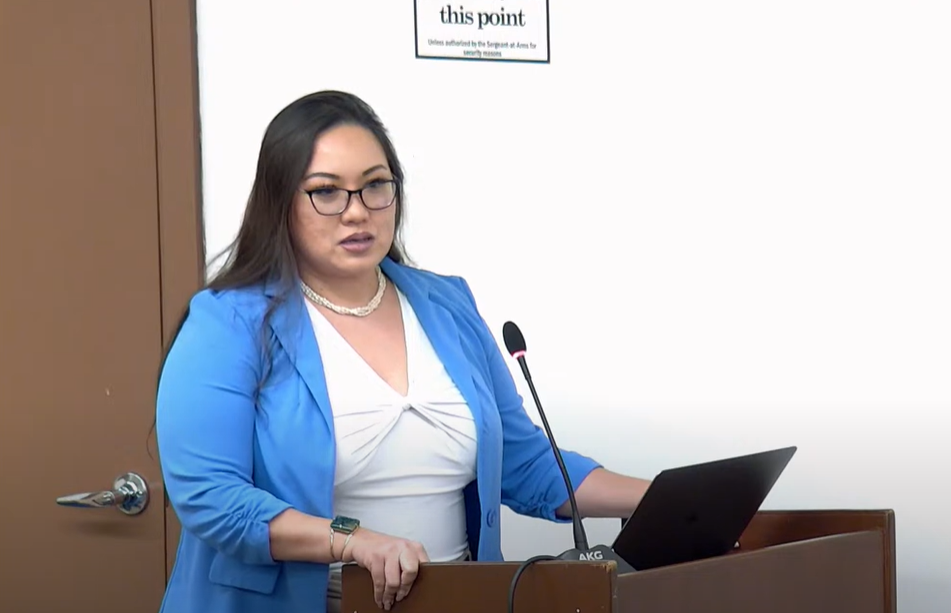
Then-Commonwealth Utilities Corporation grants writer Candice Nicole LG Muna appears before a joint Public Utilities, Transportation & Communications Conference Committee in the House chamber on Thursday, Oct. 3, 2024.
POWER rate studies and rate calculations are standard public documents, Kannai Komunidat-Payúúr Toulap or the Hands of the Community group said.
“Kannai Komunidat submitted a request under the CNMI Open Government Act to the Commonwealth Utilities Corporation seeking essential public information regarding rate studies and the basis upon which rates have been determined,” said the community group’s president, Candice Muna, a former CUC grants writer.
In a statement issued Sunday, Muna said, “This request was made in the interest of transparency and accountability, as such information is crucial for the general public, utility regulators, and stakeholders to understand how utility rates are calculated and justified.”
On Nov. 25, 2024, Kannai Komunidat asked CUC to provide documentations and records regarding power generation, the Fuel Adjustment Charge calculations, and financial and rate-setting records.
At a special CUC board meeting on Thursday, CUC Executive Director Kevin Watson discussed Kannai Komunidat’s request and sought the CUC board’s guidance on what information could be released to the group.
Watson noted that Kannai Komunidat’s request included information that he and the rest of CUC’s management “deemed to be a security risk if released, as we would no longer have control over where the information is shared.”
He cited as an example detailed operational information regarding the CUC power plant. “Do we release that?” he asked the board.
CUC Board Member Simon Sanchez, for his part, said under the Open Government Act, “some information is eligible for release and some things are not eligible for release.”
According to Muna, “CUC’s assertion that releasing [certain] information could pose a security risk is deeply concerning and raises serious questions about the organization’s commitment to transparency.”
She said, “Rate studies, historical data, and consultant reports are standard public documents in most jurisdictions and should not be shielded from public scrutiny unless they legitimately contain sensitive national security details — which, in this case, seems highly unlikely.”
“It is troubling to see an institution that serves the public resisting efforts to provide basic information that affects every resident of the CNMI,” she added. “Public utilities operate for the benefit of the community, and their actions must align with the principles of openness and accountability. Kannai Komunidat reiterates that understanding the basis of rates is not only a right under the CNMI Open Government Act but a fundamental expectation of any public utility.”
The group urges CUC to reconsider its position “and provide the requested information without further delay.”
Muna added, “Transparency fosters trust, and it is only through open communication that we can collectively address the pressing issues facing our utility services.”
The group specifically asked for “all tariff and rate studies done over the past 20 years; reports or studies used to set electricity rates, including [the Levelized Energy Adjustment Clause or] LEAC and FAC adjustments.”
On Nov. 27, 2024, in his reply to Kannai Kommunidat, Watson asked for more time to provide the requested information.
“CUC will require more than the standard 10-day period to collect, review, and make available all public records responsive to your requests. We will do our best to have a response to you by Monday, Dec. 16. If an initial production of public records is available for your inspection and copying sooner, we will promptly inform you,” he said.











